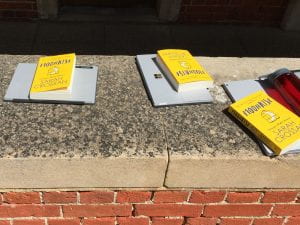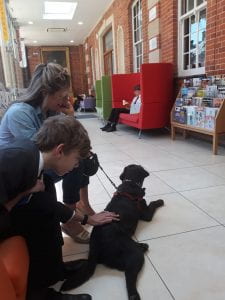Y9 reading week – Summer Term 2019
‘Moonrise’ by Sarah Crossan
‘A very quick read that will emotionally stick with you forever.’
Looking for a meaningful focus for the final week of the school year the Head of 3rd form proposed a ‘Reading Week’. This fitted perfectly with the whole school aim to encourage and promote more reading across all year groups and the Head of English and Library staff were keen to get involved and support this.
We agreed that we liked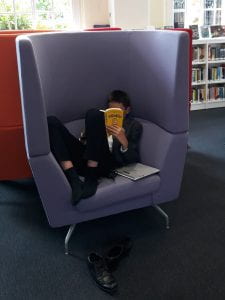 the idea of all students reading the same book during the week with a part of each lesson (and possibly the whole lesson in some cases) dedicated to quiet individual reading – or reading aloud in groups of around the class. We invited teachers to bring classes to the library for a change of venue in a comfortable, informal environment.
the idea of all students reading the same book during the week with a part of each lesson (and possibly the whole lesson in some cases) dedicated to quiet individual reading – or reading aloud in groups of around the class. We invited teachers to bring classes to the library for a change of venue in a comfortable, informal environment.
The tricky bit was deciding on a book. We agreed we wanted it to be fiction and preferably a shortish, accessible, recently published YA title with emphasis on the enjoyment of the reading experience and far removed from the feel of an English lesson ‘set text’. It was important that the book would draw in self-confessed ‘reluctant readers’ while at the same time being an enjoyable experience for keen readers. I read many YA books I’d been planning to read and English teachers recommended some of their favourites before e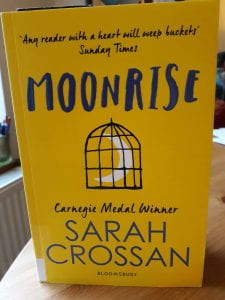 ventually agreeing on ‘Moonrise’ by Sarah Crossan. Our Head of English raced to finish reading it and was very moved by it. We both agreed that the themes were thought-provoking and encouraged discussion of the issues of capital punishment and death row.
ventually agreeing on ‘Moonrise’ by Sarah Crossan. Our Head of English raced to finish reading it and was very moved by it. We both agreed that the themes were thought-provoking and encouraged discussion of the issues of capital punishment and death row.
The reading week was launched in a year group assembly and I introduced the book and gave a brief overview of the scenario and characters. We were delighted that Sarah Crossan sent us a witty video message which we played in the assembly and the students spontaneously applauded.
As they left the assembly each student was given a copy of ‘Moonrise’ to read and keep. Any returned will be kept in the library as a loanable tutor group set.
Feedback from teachers and students was very positive. The Head of Y10 is keen to run something similar for her year group at the end of the Summer Term next year and we will refine and develop this idea for Y9 next year. I certainly enjoyed my time reading in the library surrounded by a class, teacher and library staff all reading in companionable 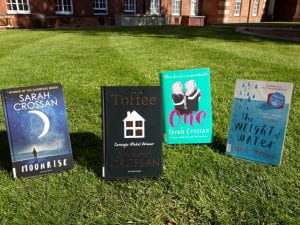 silence. It was lovely to see two girls come into the library to borrow more of Sarah’s books as they’d finished ‘Moonrise’ and wanted to read other similar books. By the end of the week all the library copies of Sarah Crossan’s books had been issued (to students and staff) and she rapidly became the 2nd most borrowed author of the year.
silence. It was lovely to see two girls come into the library to borrow more of Sarah’s books as they’d finished ‘Moonrise’ and wanted to read other similar books. By the end of the week all the library copies of Sarah Crossan’s books had been issued (to students and staff) and she rapidly became the 2nd most borrowed author of the year.
We also had two visits from staff dogs to the library to keep the students company and ran book cover quizzes and book dingbats.
So far my very brief questionnaire, sent out in the holidays has had 44 responses (out of a year group of 185).
- All of the respondents either finished reading the novel in school during the week or finished it in their free time afterwards.
- Only 1 student said they didn’t enjoy having time to read in lessons during the week.
There were some very interesting and positive comments about the book:
It was very sad, and made me reconsider my thoughts on the death penalty.
I thoroughly enjoyed reading Moonrise and thought it was an excellent read!!
It was really good I liked that it was written in verse as it was a nice change from other novels I have read.
A very quick read that will emotionally stick with you forever.
It was extremely good but had a very traumatic ending.
I thought that the ending made the book more relatable.
It’s awesome.
I found it extremely eye-opening and heart wrenching. I always enjoy these books and the format is very effective at emphasising certain aspects of the story.
Really clever the format in which the pages were written.
I liked how the pages weren’t very long, meaning it was easy to read and you felt like you had made more progress in the book than you actually had.
The writing style made the book quick and easy to read. The story builds up to a climax, ending very sadly. It made me think about what it would be like to be in a disjointed family.
I found it hard to concentrate on the story line when all the pages were printed as poems on different lines.
I asked the students to suggest a possible book for next year and these were there suggestions:
- The Hate U Give by Angie Thomas
- Sapiens by Yuval Noah Harari
- Blood Ties by Sophie Mackenzie
- Numbers by Rachel Ward
- After the Fire by Will Hill
- Noughts and Crosses by Malorie Blackman
- Red Rising by Pierce Brown
- Release by Patrick Ness
- Skulduggery Pleasant by Derek Landy
- Bodyguard by Chris Bradford
- Any Jodi Picoult
- I think a modern classic would be good so that classics can be gently introduced to get rid of any reticence to read them!
